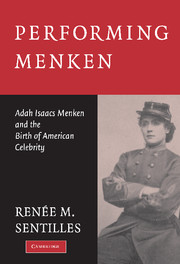Book contents
9 - Remembering and Rewriting Menken
Published online by Cambridge University Press: 05 July 2014
Summary
The Menken is dead. The bare-faced, bare-limbed, reckless, erratic, ostracized, but gifted, kind-hearted, successful, yet ill-starred Menken is no more. … She has no more lacqueys, no more toadies, no more flatterers now. No critics shall eat her dinners and then abuse her in their papers; no authors shall borrow money of her and then lampoon her.
Americans learned of Menken's death on August 12, 1868, when newspapers across the nation printed information they had received by telegraph. News of her death initially took up little space in the papers, since it competed with both the passing of Senator Thaddeus Stevens and a cattle plague that threatened to destroy the United States beef industry. The debate over Menken's character began two weeks after her death, when Infelicia first arrived in London bookstores, and it gathered momentum when the volume appeared in the United States two months later. First there was the death of Menken, then the reviewing of her poetry, and finally the process of remembering and rewriting her, which continues today. Images of Menken changed over time, as she receded into the past. Eventually, many would claim to see the “true Menken” behind the performance of celebrity, but they saw different things. The contradictory images that she herself had fostered, and her many marriages and famous liaisons, made her an ideal subject for those interested in mining the social and cultural margins of the past as well as for those simply looking to sell print.
- Type
- Chapter
- Information
- Performing MenkenAdah Isaacs Menken and the Birth of American Celebrity, pp. 258 - 286Publisher: Cambridge University PressPrint publication year: 2003



